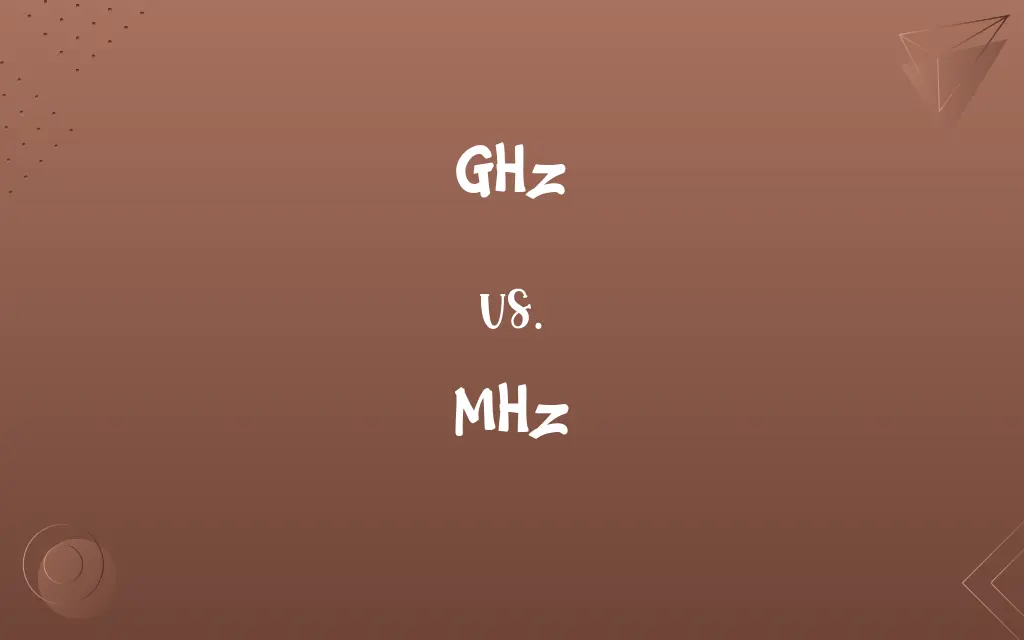GHz vs. MHz: Know the Difference

By Shumaila Saeed || Published on February 12, 2024
GHz (Gigahertz) and MHz (Megahertz) are units of frequency; 1 GHz equals 1,000 MHz.

Key Differences
GHz, short for Gigahertz, represents a billion cycles per second and is commonly used to measure the clock speed of computer processors. In contrast, MHz, which stands for Megahertz, denotes a million cycles per second and was more commonly used in older or less powerful technology.
Shumaila Saeed
Feb 12, 2024
Processors operating in the GHz range are significantly faster and more efficient than those measured in MHz. MHz, while lower in frequency, was the standard measurement during the early years of computing.
Shumaila Saeed
Feb 12, 2024
In modern technology, GHz is the preferred unit for expressing processing speeds, indicating quicker data processing capabilities. MHz is still relevant but often pertains to less demanding applications such as radio frequencies.
Shumaila Saeed
Feb 12, 2024
The transition from MHz to GHz in computing reflects advancements in technology and increased demand for processing power. Devices with GHz processors can handle more complex tasks compared to those limited to MHz speeds.
Shumaila Saeed
Feb 12, 2024
Understanding the difference between GHz and MHz is crucial for evaluating the performance of electronic devices, with GHz indicating higher speed and efficiency than MHz.
Shumaila Saeed
Feb 12, 2024
ADVERTISEMENT
Comparison Chart
Technological Era
Current, advanced technology
Earlier, less advanced technology
Shumaila Saeed
Feb 12, 2024
Performance Indication
Suitable for complex tasks
Suitable for simpler tasks
Shumaila Saeed
Feb 12, 2024
ADVERTISEMENT
GHz and MHz Definitions
GHz
GHz is a unit of frequency representing one billion cycles per second.
This computer's processor runs at 3.5 GHz.
Shumaila Saeed
Jan 15, 2024
MHz
MHz signifies lower processing speeds in modern contexts.
Some embedded systems still use MHz CPUs.
Shumaila Saeed
Jan 15, 2024
GHz
GHz often measures the speed of modern computer processors.
Higher GHz means better performance for gaming.
Shumaila Saeed
Jan 15, 2024
MHz
MHz is less than GHz in frequency measurement.
This device's frequency is measured in MHz, not GHz.
Shumaila Saeed
Jan 15, 2024
GHz
GHz indicates faster processing capabilities.
My new laptop's 2.6 GHz CPU is very efficient.
Shumaila Saeed
Jan 15, 2024
ADVERTISEMENT
MHz
MHz is relevant in less demanding technology applications.
Wireless routers often use MHz for signal transmission.
Shumaila Saeed
Jan 15, 2024
GHz
GHz is a higher frequency unit than MHz.
Advancements in technology have moved from MHz to GHz.
Shumaila Saeed
Jan 15, 2024
MHz
MHz was commonly used to measure early computer speeds.
My first computer had a processor speed of 800 MHz.
Shumaila Saeed
Jan 15, 2024
GHz
GHz is crucial for understanding computing power.
Smartphones now have CPUs with GHz speeds.
Shumaila Saeed
Jan 15, 2024
MHz
MHz is a unit of frequency equal to one million cycles per second.
Older radios operate at various MHz frequencies.
Shumaila Saeed
Jan 15, 2024
Repeatedly Asked Queries
Can MHz still be used in modern devices?
Yes, but typically in less demanding applications.
Shumaila Saeed
Feb 12, 2024
Is GHz faster than MHz?
Yes, GHz represents higher frequencies and faster speeds.
Shumaila Saeed
Feb 12, 2024
What is a common use for MHz?
In older computing technology and radio frequencies.
Shumaila Saeed
Feb 12, 2024
Are GHz and MHz interchangeable units of measurement?
No, GHz and MHz are not interchangeable, as they represent different orders of magnitude in frequency.
Shumaila Saeed
Feb 12, 2024
In what context would you use GHz instead of MHz or vice versa?
GHz is typically used for higher-frequency measurements like processor speeds, while MHz is used for lower-frequency components like RAM and peripherals.
Shumaila Saeed
Feb 12, 2024
Are GHz and MHz interchangeable?
No, they represent different magnitudes of frequency.
Shumaila Saeed
Feb 12, 2024
Which is faster, GHz or MHz?
GHz is faster than MHz because it represents a higher frequency, indicating more cycles per second.
Shumaila Saeed
Feb 12, 2024
What devices commonly use GHz?
Modern computers, smartphones, and high-speed processors.
Shumaila Saeed
Feb 12, 2024
How do GHz and MHz relate to data transmission speeds in networking?
In networking, GHz and MHz are used to describe the frequency bands for wireless communication, with higher frequencies often indicating higher data transmission speeds.
Shumaila Saeed
Feb 12, 2024
How does GHz relate to computer performance?
Higher GHz generally indicates better performance.
Shumaila Saeed
Feb 12, 2024
Can you convert GHz to MHz or vice versa?
Yes, you can convert GHz to MHz by multiplying by 1,000 (1 GHz = 1,000 MHz) or MHz to GHz by dividing by 1,000.
Shumaila Saeed
Feb 12, 2024
Can you compare the GHz ratings of different processor brands and generations?
GHz ratings alone are not sufficient for comparing processors, as other factors like architecture, cores, and cache size also play a crucial role in performance.
Shumaila Saeed
Feb 12, 2024
Why has the industry moved from MHz to GHz?
Due to advancements in technology and demand for faster processing.
Shumaila Saeed
Feb 12, 2024
Why do we use GHz and MHz in electronics and computing?
GHz and MHz are used to describe frequencies in electronics and computing because they are convenient units for measuring the speed and performance of various components.
Shumaila Saeed
Feb 12, 2024
Share this page
Link for your blog / website
HTML
Link to share via messenger
About Author
Written by
Shumaila SaeedShumaila Saeed, an expert content creator with 6 years of experience, specializes in distilling complex topics into easily digestible comparisons, shining a light on the nuances that both inform and educate readers with clarity and accuracy.








































































